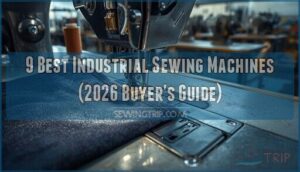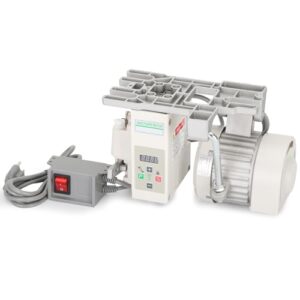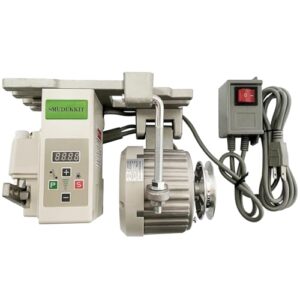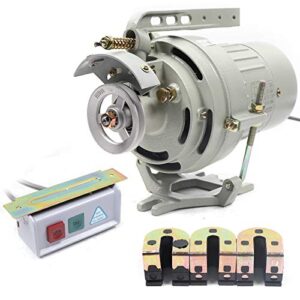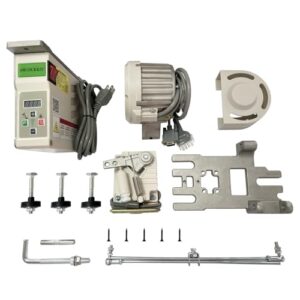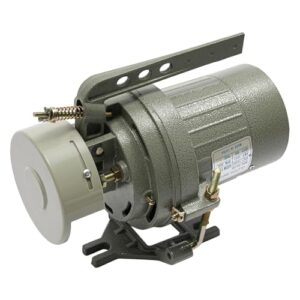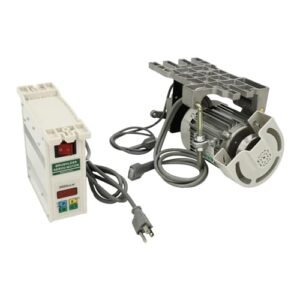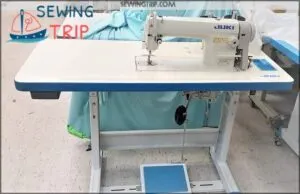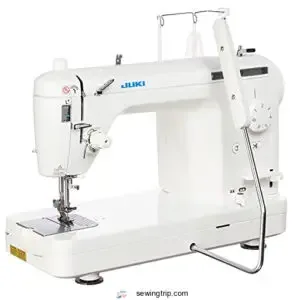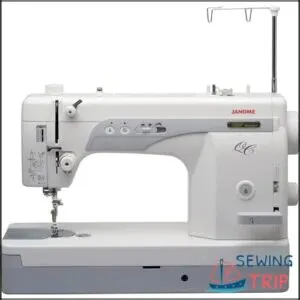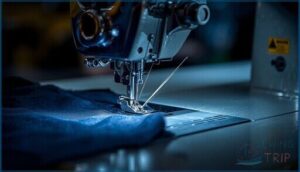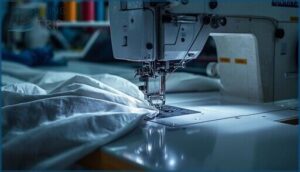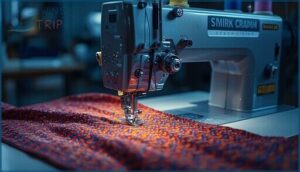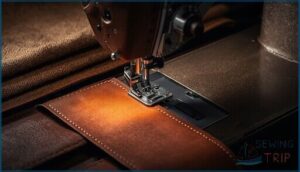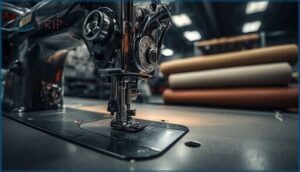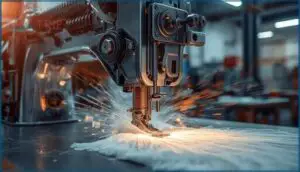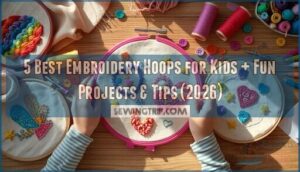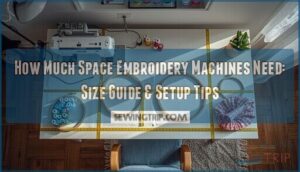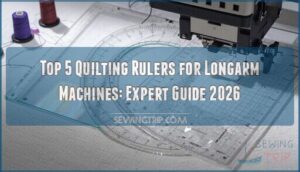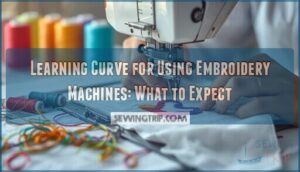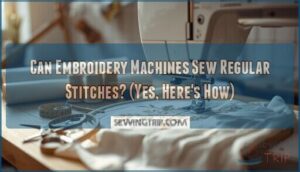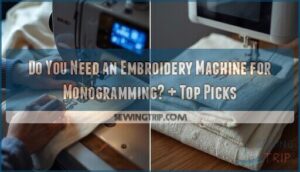This site is supported by our readers. We may earn a commission, at no cost to you, if you purchase through links.
Your business won’t survive on a domestic machine when you’re churning out 500 denim jackets a week. The difference between industrial and consumer-grade equipment isn’t subtle—it’s the gap between meeting deadlines with precision control or burning through motors every three months.
Industrial sewing machines deliver stitching speeds that reach 5,000 RPM, motor systems engineered for continuous eight-hour shifts, and specialized feet that conquer leather upholstery like butter. Servo motors slash your energy bills by 70% compared to clutch systems, while brushless designs eliminate the vibration that ruins seam accuracy.
Whether you’re launching an apparel line or scaling your upholstery workshop, the right machine transforms your production capacity and defines your competitive edge.
Table Of Contents
- Key Takeaways
- Top 9 Best Industrial Sewing Machines
- 1. Servo Motor for Sewing Machines
- 2. Industrial Sewing Machine Servo Motor
- 3. Industrial Sewing Machine Clutch Motor
- 4. Sewing Machine Servo Motor
- 5. Industrial Sewing Machine Motor
- 6. TuBaSaki Brushless Sewing Machine Motor
- 7. Juki Industrial Straight Stitch Sewing Machine
- 8. Juki Straight Stitch Sewing Machine
- 9. Janome High Speed Sewing Machine
- Types of Industrial Sewing Machines
- Key Features to Consider
- Industrial Sewing Machine Motor Guide
Key Takeaways
- Industrial sewing machines deliver production speeds between 2,000 and 5,500 stitches per minute with servo motors that cut energy costs by 60-70% compared to traditional clutch systems, making them essential for high-volume operations handling heavy fabrics like leather, canvas, and denim.
- Servo motors provide precise speed control and quiet operation ideal for varied fabric weights, while brushless motors offer superior energy efficiency and reduced maintenance, and clutch motors deliver raw torque for heavy-duty applications—your choice directly impacts production capacity and operating costs.
- Leading brands like Juki, Brother, and Consew dominate the industrial market with machines priced from $800 for entry-level models to $10,000+ for specialized equipment, with total ownership costs including energy consumption, maintenance, and parts availability determining long-term ROI of 15-40% depending on utilization.
- Regular maintenance including weekly oiling, professional servicing every 6-12 months, and access to genuine replacement parts separates machines that last 5 years from those delivering 25+ years of reliable performance, making upkeep critical to protecting your investment.
Top 9 Best Industrial Sewing Machines
You’re about to discover the machines that’ll transform your production capabilities and access professional-grade results.
Explore automatic sewing devices to compare technical specifications, throughput ratings, and automation features that align with your workflow demands.
This carefully curated selection includes the most powerful motors and high-performance machines that serious sewers depend on daily.
One standout example is the Singer Quantum Stylist 9980, a computerized powerhouse that delivers the precision and versatility professionals expect from top-tier equipment.
Let’s explore each option so you can choose the perfect match for your workspace and projects.
If you need extra surface area or adjustable height, check out these large quilting machine tables designed for bigger projects.
1. Servo Motor for Sewing Machines
A servo motor transforms your industrial sewing machine into a precision powerhouse. You’ll gain superior servo control that slashes energy consumption by up to 60% compared to outdated clutch motors, delivering impressive energy savings that cut operating costs.
Modern industrial sewing machines for garment manufacturing pair servo motors with lockstitch technology to maximize both speed and stitch consistency across production runs.
The motor efficiency kicks in immediately with adjustable sewing speed from whisper-slow to full throttle, perfect for tackling delicate silks or thick leather.
Plus, you’ll enjoy noise reduction down to 50-70 dB during operation, making your workspace quieter and more comfortable while the sewing machine technology manages any project you throw at it.
| Best For | Industrial sewing operators who need precise speed control and energy savings when working with materials ranging from delicate fabrics to heavy leather up to 1/2″ thick. |
|---|---|
| Power | 600W |
| Voltage | 110V |
| Motor Type | Servo Motor |
| Speed Control | Adjustable |
| Operation Noise | Quiet |
| Use Case | Heavy-Duty Industrial |
| Additional Features |
|
- Cuts energy consumption by up to 60% compared to clutch motors, lowering your operating costs while delivering powerful 600W performance for thick materials
- Adjustable speed control gives you exact needle positioning and stable stitching at any pace, from slow detail work to high-speed production runs
- Quieter operation at 50-70 dB makes your workspace more comfortable and reduces fatigue during long sewing sessions
- No installation instructions included, so you’ll need to figure out setup on your own or search online for guidance
- May require extra parts like a new belt or needle position sensor depending on your machine, adding to the initial cost
- Average build quality according to some users, with unknown long-term durability that might become an issue down the road
2. Industrial Sewing Machine Servo Motor
You’ll access outstanding performance with the SMUDUKKIT 3/5HP brushless servo motor, delivering 6000 RPM at 110 volts for your industrial sewing machines. This servo motor efficiency champion slashes electricity use by 70%, while motor noise reduction technology creates whisper-quiet operation ideal for extended production runs.
The integrated controller with foot switch gives you precise variable speed control, and the three-phase brushless design ensures smooth industrial automation.
Energy saving technologies combine with compact installation, though you should verify compatibility and adjust speed settings before your first stitch to master this sewing machine technology upgrade.
| Best For | Industrial sewing operators who want to cut energy costs and noise while gaining precise speed control for detailed stitching work. |
|---|---|
| Power | 450W (3/5HP) |
| Voltage | 110V AC |
| Motor Type | Brushless Servo |
| Speed Control | Variable (6000 RPM) |
| Operation Noise | Silent |
| Use Case | Industrial Sewing |
| Additional Features |
|
- Cuts electricity use by up to 70% compared to traditional clutch motors, lowering operating costs during long production runs
- Ultra-quiet brushless operation keeps noise levels down, making it comfortable for all-day use in any workspace
- Variable speed control with foot switch lets you ramp up gradually and dial in exact speeds for different fabrics and techniques
- Controller is permanently attached to the motor, which limits flexible placement and may complicate some installations
- Some users have reported error messages or compatibility issues, so double-check your machine’s specs before buying
- Speed settings need adjustment right out of the box to prevent the motor from jumping to full speed unexpectedly on first use
3. Industrial Sewing Machine Clutch Motor
You’ll command heavyweight stitching power with the 400W clutch motor delivering 3450 RPM and switchable 110V/220V voltage for adaptable industrial sewing machines. While servo motors and brushless motors offer enhanced motor efficiency, clutch motor types excel in torque delivery for heavy leather and upholstery applications without complex electronics.
You’ll regulate sewing speed control through the foot pedal, though clutch maintenance requires regular belt inspections and tension adjustments. The shock-absorbing design reduces vibration during operation, and reversible motor options remain available when your projects demand directional flexibility across various fabric weights.
| Best For | Industrial sewing operators working with heavy fabrics like leather and upholstery who need rugged, high-torque performance without the complexity of electronic speed controls. |
|---|---|
| Power | 400W (1/2HP) |
| Voltage | 110V/220V Switchable |
| Motor Type | Clutch Motor |
| Speed Control | 3450 RPM |
| Operation Noise | Reduced Noise |
| Use Case | Industrial Sewing |
| Additional Features |
|
- Delivers strong torque at startup, making it ideal for punching through thick materials like leather and canvas without bogging down
- Switchable voltage (110V/220V) and straightforward mechanical design means you can use it almost anywhere with minimal setup
- Lower upfront cost compared to servo or brushless systems, plus the simple belt-driven mechanism is easy to understand and repair
- Speed control relies entirely on your foot pedal skill and mechanical adjustments—no fine electronic tuning for delicate or variable-speed work
- Belts and pulleys need regular inspection, tensioning, and replacement, adding ongoing maintenance compared to modern motor types
- Can be noisier and less energy-efficient than servo motors, and some users report compatibility issues with certain machine models
4. Sewing Machine Servo Motor
You’ll achieve outstanding servo motor efficiency with the SMUDUKKIT 450-watt three-phase brushless motor, cutting electricity costs up to 70% while operating whisper-quiet at 6000 RPM. This reversible motor integrates electronic feedback systems for precise sewing machine automation, maintaining consistent stitch timing even under varying fabric resistance.
Motor controller calibration ensures +/-1% RPM accuracy for critical applications, while energy saving strategies include programmable acceleration profiles through your foot switch.
Unlike traditional clutch motor configurations, this brushless motor offers closed-loop control that adjusts power draw dynamically, making it a standout choice in any motor selection guide.
| Best For | Industrial sewing operators who want to cut energy costs by up to 70% while enjoying quiet, vibration-free operation with precise speed control for straight lockstitch applications. |
|---|---|
| Power | 450W (3/5HP) |
| Voltage | 110V AC |
| Motor Type | Brushless Servo |
| Speed Control | Variable (6000 RPM) |
| Operation Noise | Quiet |
| Use Case | Straight Lockstitch |
| Additional Features |
|
- Saves up to 70% on electricity compared to clutch motors while running whisper-quiet at 40–60 dB, making your workspace much more comfortable during long sessions.
- Delivers precise electronic speed control with closed-loop feedback that maintains consistent stitch timing even when fabric resistance changes mid-seam.
- Runs cooler and requires less maintenance than traditional clutch systems thanks to solid-state electronics and brushless design.
- Assembly and installation can be tricky, especially since the instructions for resetting motor direction are often poorly translated and confusing.
- Limited torque makes it less suitable for heavy-duty fabrics or complex multi-layer sewing tasks that demand more power.
- May throw error codes with certain advanced features like needle positioners and could require a speed reducer for optimal performance on some machines.
5. Industrial Sewing Machine Motor
You’ll find that industrial sewing machine motor selection directly impacts your speed control and torque output across all fabric types! Servo motors deliver outstanding motor efficiency with precise RPM modulation, while brushless motors slash power consumption up to 60% compared to traditional designs.
Clutch motors provide reliable high-torque performance for leather and canvas applications, though they require more frequent sewing machine maintenance.
Your motor selection guide should prioritize noise reduction features and energy ratings—decisions that transform your production line into a powerhouse of consistent stitching performance.
| Best For | Businesses running heavy-duty industrial sewing operations that need reliable power for thick materials like leather and canvas, especially when working with clutch-driven machines. |
|---|---|
| Power | 550W (3/4HP) |
| Voltage | 110V |
| Motor Type | Brushless Servo |
| Speed Control | Adjustable |
| Operation Noise | Quiet |
| Use Case | Light to Heavy Duty |
| Additional Features |
|
- Delivers solid 400W power at 3450rpm with switchable 110V/220V voltage, making it adaptable to different workshop setups without needing separate equipment.
- Built tough with cast iron and aluminum construction that holds up to constant industrial use, plus shock-absorbing pads that cut down on vibration noise during long production runs.
- Comes ready to install with pre-drilled mounting holes, English instructions, and all the hardware you need to get up and running quickly.
- Ships with potential cosmetic damage like dented vent covers, so you might receive a unit that looks worn even if it works fine.
- Weighs quite a bit and takes up space, which can be a hassle if you’re moving it around or working in a tight area.
- Won’t work with every sewing machine out there—you’ll need to double-check compatibility with your specific model before buying to avoid a mismatch.
6. TuBaSaki Brushless Sewing Machine Motor
The TuBaSaki brushless sewing machine motor transforms your industrial sewing machines with remarkable motor efficiency that cuts energy use by up to 60%! This brushless design delivers sewing speed from 500 to 4,500 RPM with whisper-quiet operation, while the 600W pure copper coil construction ensures superior durability for industrial applications.
You’ll appreciate dramatically reduced sewing machine maintenance costs since brushless motors eliminate carbon brush replacements entirely, and the adjustable direction control offers flexibility that traditional servo motor systems simply can’t match.
For sewers working with denim or canvas, choosing machines built with durable frame construction ensures your stitches stay precise even under the strain of demanding projects.
| Best For | Industrial sewing operators looking to upgrade from clutch motors who want energy savings, quieter operation, and reduced maintenance hassles on straight stitch, overlock, or zigzag machines. |
|---|---|
| Power | 400W (1/2HP) |
| Voltage | 110V/220V Switchable |
| Motor Type | Clutch Motor |
| Speed Control | 3450 RPM |
| Operation Noise | Reduced Noise |
| Use Case | Industrial Sewing |
| Additional Features |
|
- Brushless design cuts energy costs by up to 60% and eliminates carbon brush replacements, saving you money on electricity and maintenance over time.
- Wide speed range of 500-4,500 RPM with independent control lever gives you precise adjustments for different fabrics and sewing tasks.
- Quiet operation and bidirectional capability make it versatile for various industrial applications without disrupting your workspace.
- Assembly required and careful size verification needed before ordering, which adds setup time and risk of compatibility issues.
- Manual measurement variations of 1-3cm and potential color differences mean what you receive might not exactly match expectations.
- Limited documentation on specific sewing machine brand compatibility may require extra research to ensure it fits your particular model.
7. Juki Industrial Straight Stitch Sewing Machine
The Juki DDL-8700 stands as a powerhouse in industrial straight stitch sewing, delivering impressive speeds of 5,500 stitches per minute with servo motor precision that manages everything from delicate silk to medium-weight canvas!
You’ll command outstanding stitch quality through adjustable stitch lengths up to 5mm, while the quiet servo motor design slashes maintenance costs compared to traditional clutch systems.
This heavy-duty industrial sewing machine transforms your weaving and fabric projects with motor efficiency that reduces energy consumption, making it perfect for professional fashion designers and sewing businesses demanding reliability without compromising performance on industrial sewing applications!
| Best For | Professional sewers, fashion designers, and small businesses who need industrial-grade speed and precision for light to medium-weight fabrics without the noise of traditional machines. |
|---|---|
| Power | 600W |
| Voltage | 110V |
| Motor Type | Brushless Servo |
| Speed Control | 500-4500 RPM |
| Operation Noise | Low Noise |
| Use Case | Light to Heavy Duty |
| Additional Features |
|
- Blazing fast at 5,500 stitches per minute with a quiet servo motor that cuts down on noise and energy costs
- Comes as a complete package with table, stand, motor, light, and drawer so you can start sewing right away
- Adjustable stitch length up to 5mm gives you control for both delicate detail work and standard sewing projects
- Can’t handle leather or heavy-duty materials, so it’s limited to lighter fabrics
- Assembly can be a real headache with instructions sometimes only in Chinese and no manual included
- Some units arrive with cosmetic damage like scratches or blemishes on the table and stand
8. Juki Straight Stitch Sewing Machine
Looking to conquer high-volume production with unwavering Stitch Precision? You’ll master every seam with Juki Straight Stitch Sewing Machine models delivering 2,000–5,000 SPM through servo or clutch Motor Efficiency options that slash energy costs while maintaining outstanding Sewing Speed!
These HeavyDuty Industrial Sewing Machines feature cast-iron frames for premium Machine Durability and minimal vibration during intensive Fabric Handling operations.
Your investment commands professional-grade bobbin systems and needle plates that guarantee uniform stitch formation across denim, canvas, and leather projects with foot pedal precision control!
| Best For | Professional sewers and quilters who need a reliable workhorse for high-speed production work, thick fabrics, and long straight seams without decorative stitching. |
|---|---|
| Power | Servo Motor |
| Voltage | 110V |
| Motor Type | Servo Motor |
| Speed Control | 5500 SPM Max |
| Operation Noise | Quiet |
| Use Case | Light to Medium Fabric |
| Additional Features |
|
- Impressive 1500 SPM speed with low vibration thanks to the aluminum die-cast frame, making it perfect for powering through large quilting projects and multiple layers of heavy fabric like denim or leather.
- Automatic needle threader and thread cutter save you time on repetitive tasks, while the extension table gives you plenty of workspace for bulky projects.
- Built tough for the long haul with industrial-grade components that deliver consistent, precise straight stitches even during marathon sewing sessions.
- Straight stitch only, so you’ll need a different machine if you want zigzag, buttonholes, or any decorative stitches.
- Some users report the automatic needle threader can be finicky or stop working, and you might need to buy a walking foot or free motion foot separately.
- At over 25 pounds it’s not exactly portable, and if you’re outside the US you’ll need a voltage converter since it’s designed for 110V power.
9. Janome High Speed Sewing Machine
You’ll dominate professional Sewing Tips territory when your Janome Machine cranks out 1,600 stitches per minute with built-in needle threader and automatic thread cutter for smooth Industrial Quilting workflows!
This Highspeed Sewing Machines champion weighs 40 pounds with a metal frame engineered for Heavy Duty Fabrics, including multiple denim layers, making it a HeavyDuty Sewing powerhouse for Industrial Sewing Machines users.
Your Janome investment features adjustable knee lift and memorized needle positioning that transform any Sewing Machine operation into precise, production-grade performance!
| Best For | Quilters and experienced sewers who need industrial-level speed and precision for heavy-duty projects like piecing quilts or sewing through multiple fabric layers. |
|---|---|
| Power | 1500 SPM |
| Voltage | 110V |
| Motor Type | Straight Stitch |
| Speed Control | 1500 SPM |
| Operation Noise | Low Vibration |
| Use Case | Quilting & Apparel |
| Additional Features |
|
- Blazing fast 1,600 stitches per minute with industrial-grade threading system and automatic thread cutter that saves time on every project.
- Heavy 40-pound metal frame handles thick fabrics and multiple layers without shifting, plus the adjustable knee lift gives you hands-free presser foot control.
- Memorized needle up/down positioning and speed control slider let you dial in exactly the pace and precision you need for different techniques.
- The needle up/down feature can’t be disabled, and the bobbin access is awkward with thread running out frequently during long sessions.
- Machine can be picky about thread and needle combinations, and some users report ongoing issues with bobbin tension and feed dog performance.
- Customer support has a reputation for being slow to respond when you run into problems or need troubleshooting help.
Types of Industrial Sewing Machines
Your industrial sewing operation demands the right machine type to match your specific production needs. Different industrial sewing machines excel at distinct tasks, from creating strong seams to finishing edges with professional precision.
Let’s explore the four essential machine types that form the backbone of modern textile manufacturing.
Lockstitch Sewing Machines
You’ll discover that lockstitch sewing machines operate with a single needle and bobbin system to deliver outstanding stitch formation for your straight seam projects! These industrial sewing machines achieve consistent thread tension at speeds ranging from 2,000 to 5,000 stitches per minute, making them perfect for fabric handling in garment production and light upholstery work.
- Single needle sewing machines create durable, reliable straight stitches through precise needle and hook timing
- Sewing speed remains consistent when you pair heavy duty sewing equipment with quality servo motors
- Maintenance costs usually run 3% to 8% annually, justified by long-term reliability and performance
- Thread tension stability ensures professional results across medium-weight knits, wovens, and blended materials
- Juki and Brother models dominate the market with wide service networks and excellent spare parts availability
Overlock Machines
While lockstitch machines handle straight seams exceptionally well, overlock machines dominate fabric finishing by trimming, stitching, and overcasting edges in one powerful pass! Your edge trimming operations benefit from 3-thread to 5-thread configurations operating at 2,000 to 7,000 stitches per minute, with differential feed preventing stretching on knits. Thread management becomes simplified with accessible threading paths and sturdy blade assemblies!
| Feature | 3-Thread Overlock | 5-Thread Overlock |
|---|---|---|
| Stitch Formation | Edge finish only | Seam + edge protection |
| Speed Range | 2,000-7,000 SPM | 2,000-6,500 SPM |
| Motor Efficiency | Servo/clutch options | Heavy duty servo recommended |
| Applications | Lightweight knits, wovens | Heavy fabrics, denim, canvas |
| Thread Management | Simplified threading | More complex setup |
Zig-Zag Machines
Beyond straight edges, zigzag stitch machines release decorative patterns and stretch fabric handling that lockstitch units can’t match! Your needle control adjusts stitch width from 0 to 12mm while maintaining remarkable stitch consistency at speeds exceeding 5,000 stitches per minute.
Motor efficiency peaks with servo-driven models offering precise fabric handling on knits, swimwear, and elastic seams where computer-controlled sewing machines would add unnecessary complexity!
Walking Foot Sewing Machines
Walking Foot Sewing Machines grip thick materials with synchronized feed dogs and needle feed working in tandem, delivering outstanding seam integrity on leather, canvas, and vinyl! Your fabric feeding controls multiple layers without shifting, maintaining stitch consistency that standard presser feet can’t achieve.
Motor torque from servo or clutch options powers through heavy duty sewing:
- Adjustable presser foot height accommodates varying fabric thicknesses
- Interchangeable presser feet expand application versatility across projects
- Juki and Brother models offer excellent performance in upholstery work
Key Features to Consider
Your machine’s features determine whether you’ll master heavy-duty projects or struggle with basic tasks. The right combination of motor power, speed control, and workspace design transforms your production capacity from amateur to professional-grade output.
Let’s examine the critical specifications that separate outstanding industrial machines from disappointing investments.
Motor Types and Performance
The motor you choose will make or break your industrial sewing machine’s performance, determining everything from energy costs to how smoothly you power through heavy fabrics!
Servo motors deliver outstanding speed control with minimal power consumption, while brushless motors provide torque output and noise reduction. Clutch motors remain reliable powerhouses for heavy-duty applications, though they lack the motor efficiency of modern alternatives.
Your sewing speed and production demands will guide this critical decision!
Stitch Speed and Customization
Modern industrial sewing machines regularly deliver stitch rates between 4,000 and 9,000 stitches per minute, giving you unrivaled speed control to dominate any fabric handling challenge. High-quality motor efficiency translates directly into precise thread tension and outstanding stitch quality across diverse materials!
Here’s what sewing technology customization enables you to master:
- Programmable sewing speed settings adjusted to specific fabric weights and projects
- Micro-adjustments to stitch length in 0.1 mm increments for precision work
- Automatic backtack and jump stitch functions that activate at seam endpoints
- Needle positioning controls that enhance your workflow and material control
Workspace Size and Build Quality
Your workspace optimization strategy starts with a compact footprint that conserves floor space while handling heavy-duty loads. Rigid frames built from cast-iron or die-cast aluminum deliver outstanding build integrity, minimizing flex during high-torque operations across demanding shifts. Reinforced bases with anti-slip mounting provisions guarantee excellent vibration control, keeping your industrial sewing machine stable and precise under sustained production pressure.
| Feature | Material/Design | Benefit |
|---|---|---|
| Frame Construction | Cast-Iron or Die-Cast Aluminum | Maximum Rigidity and Durability |
| Base Design | Reinforced with Anti-Slip Mounting | Excellent Vibration Control |
| Footprint | Compact Work Envelope | Optimized Floor Space Utilization |
Automatic Functions and Controls
Programmable speed controls let you dial in exact RPM settings for delicate fabrics or high-volume runs, giving you command over every production phase. Sewing automation with computer-controlled sewing machines transforms industrial sewing machine selection by delivering precision at your fingertips!
- Automatic trimming slashes thread waste and cycle time between seams.
- Stitch regulation maintains consistent tension across variable materials.
- Motor efficiency optimizations reduce energy costs during extended shifts.
- Control systems with sewing technology and innovation presets simplify operator training and boost throughput.
Industrial Sewing Machine Motor Guide
Your machine’s motor determines everything from stitch precision to energy costs and noise levels in your workspace. Each motor type offers distinct advantages that match specific sewing applications and production demands.
Let’s break down the four main motor options so you can pick the one that powers your productivity.
Servo Motor Benefits
You’ll slash energy bills by up to 60 percent when you upgrade to a servo motor on your industrial sewing machines. Speed precision stays rock-solid with under 10 percent variance during load changes, delivering consistent stitch quality your clients demand. Noise reduction drops below 70 dB, transforming your workspace into a quieter, safer environment while motor control features enable programmable patterns and automatic adjustments that boost your daily production hours.
| Servo Motor Feature | Performance Impact | Your Bottom Line Benefit |
|---|---|---|
| Energy Efficiency | 60% consumption cut vs clutch | Lower monthly operating costs |
| Speed Precision |
- https://github.com/vinhphunguyen/how-to-write-a-paper/blob/master/how-to-write-paper.brf
- https://www.sewingmachinesplus.com/sewing-machines-reliable-2000u33.php
- https://www.sciencedirect.com/science/article/pii/S0260691723000977
- https://pmc.ncbi.nlm.nih.gov/articles/instance/9553038/bin/pone.0275964.s005.docx
- https://x.com/godofprompt/status/1990526288063324577

